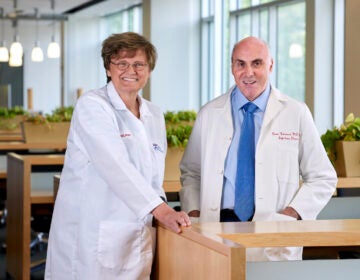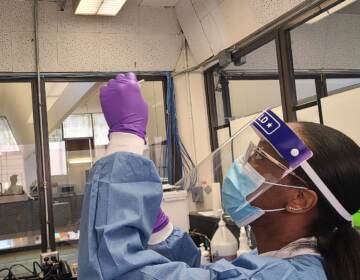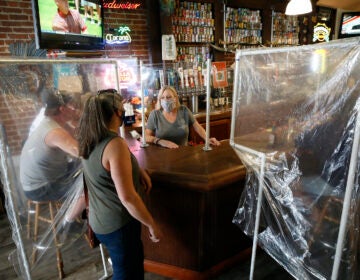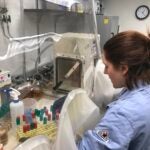What if you want a COVID-19 test but don’t have health insurance?
Now that test kits are more available, there has been some concern fear of cost might deter underinsured or uninsured Americans from getting tested.
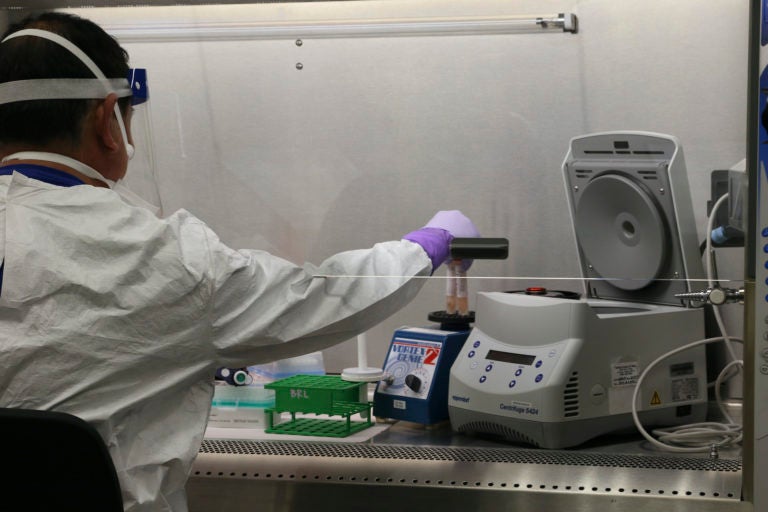
Hawaii state Department of Health microbiologist Mark Nagata demonstrates the process for testing a sample for coronavirus at the department's laboratory in Pearl City, Hawaii. (Audrey McAvoy/AP Photo)
Whether someone coughed near you on the subway or you have a neighbor who just got back from an international trip, if you’ve developed a cough or a fever lately you might be worried it’s more than just the flu. The first step if you think you may have been exposed to COVID-19 is to get tested.
But what if you don’t have health insurance? Or you have insurance but no primary care doctor, and you want to avoid a possibly costly trip to the emergency room?
Testing is one cornerstone of containing the coronavirus. And now that test kits are becoming more widely available in this country, there has been some concern that fear of cost might deter underinsured or uninsured Americans from getting tested.
That fear is not unfounded, according to Evan Anderson, a University of Pennsylvania public health researcher.
“For the people that are uninsured, they could very easily be looking at a few thousand dollars in charges at least,” Anderson said. “Even for people who are insured, they may very well have a high deductible, and they could still be facing a $1,000 charge.”
(That happened in Florida, where a man who thought he might have coronavirus went to the emergency room. Knowing he had limited insurance, he asked for a flu test before a coronavirus screening, according to the Miami Herald — and it turned out he did have the flu. He was charged $3,271 and left with a $1,400 bill after insurance, the Herald reported.)
Tests for COVID-19, from either the Centers for Disease Control and Prevention or through state labs in Pennsylvania or New Jersey are free. Delaware’s state lab also has been approved to test samples; it could not be immediately determined whether testing is free in that state.
If you think you might have COVID-19, don’t panic, health officials advise. Assuming you don’t have a high fever or difficulty breathing, a trip to the hospital isn’t necessary, and coughing and fever might be the seasonal flu. Your doctor will consider testing if you have symptoms and have either traveled to an area where COVID-19 is spreading or have been exposed to a confirmed case. People hospitalized with severe respiratory symptoms may also be tested. Guidelines for testing are issued by the CDC and will likely continue to change.
Currently, getting tested just requires the approval of a doctor, so speaking with a health care practitioner will be a necessary first step if you think you might be sick.
What if you don’t have a primary care practitioner to call? In Philadelphia, you can go to the ER, a clinic or an urgent care center. All have been briefed by the city’s Department of Public Health and should be able to make sure you get a test.
“If someone doesn’t have a regular health care provider, and walks into one of these urgent care clinics or the emergency department, those health care providers have been instructed to call us and let us know we have someone here that’s displaying symptoms similar to coronavirus,” said James Garrow, a spokesperson for the city’s Department of Public Health. “If they have materials to collect samples, they will. We’ll pick them up and send them to the lab. If they don’t, our staff will go out and collect the samples.”
The Health Department will work with health providers to ensure that samples can be tested, and that offices and clinics are ready to receive a possible case of COVID-19, with masks and a private room, he said.
Bottom line, whether you have insurance or not, seek medical care. For advice, you can call the Philadelphia Health Department at the city’s 311 number, or Pennsylvania’s Health Department at 1-877-724-3258. In New Jersey, contact the Department of Public Health at 1-800-222-1222. For those in Delaware, the number is 1-866-408-1899. Most importantly, before you go, call your doctor, or the urgent care center or clinic you plan on going to, to let them know you think you might have coronavirus, so they can notify a hospital in advance.
If you don’t want to go to the emergency room and don’t have a primary care doctor, there are nine Philadelphia health centers, as well as other federally qualified health centers run by nonprofits like the PHMC Health Center at Temple, and the Esperanza Health Center. Not all of these health centers currently have the ability to test, but all are in contact with the Department of Public Health.
“All of those locations have been briefed on what to do if they get this call,” Garrow said.
After you’ve been tested, the next step is waiting. “People should self-quarantine between the time in which they are tested, and when the results come back,” said Nate Wardle, press secretary for the Pennsylvania Department of Health.
This is still a developing situation. As new U.S. cases emerge, states will likely roll out new policies. Vice President Mike Pence announced Tuesday that Medicare and Medicaid would cover COVID-19 testing.
In New York state, Gov. Andrew Cuomo has extended emergency measures for insurers there to waive cost-sharing and charge no co-pays to those on Medicaid.
Perhaps other states won’t need to: On Monday, U.S. Rep. Ruben Gallego, D-Ariz., announced a bill that would provide Medicaid coverage of COVID-19 testing for all Americans.
 WHYY is one of more than 20 news organizations producing Broke in Philly, a collaborative reporting project on economic mobility. Read more at brokeinphilly.org or follow at @brokeinphilly.
WHYY is one of more than 20 news organizations producing Broke in Philly, a collaborative reporting project on economic mobility. Read more at brokeinphilly.org or follow at @brokeinphilly.
WHYY is your source for fact-based, in-depth journalism and information. As a nonprofit organization, we rely on financial support from readers like you. Please give today.


![CoronavirusPandemic_1024x512[1]](https://whyy.org/wp-content/uploads/2020/03/CoronavirusPandemic_1024x5121-300x150.jpg)
